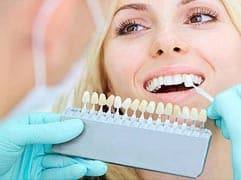Options for Restoring Decayed Teeth
Dentistry Built on Relationships, Honesty, and Trust
Des Moines Iowa's Solution for Restoring Decayed Teeth
Nothing brightens a room and connects people to each other like the radiant warmth of a genuine smile. It’s a treasure to protect and guard with diligence and care.
But unfortunately, even if you take extra good care of your smile something can still happen to your teeth.
We will work with you to create a plan that will both fit your schedule and your budget. If you need more than one procedure to restore your smile, we may recommend that they are completed over time — we may even recommend a combination of procedures, including treatment for gum disease, fluoride treatments, bonding, and crowns.
Our restorative services include:
Don’t forget to ask us how we can work together to keep your care affordable. We take most dental insurances, always work to maximize your benefits, and offer payment plans to keep your restorative dental care budget friendly.

What is Tooth Decay?
Tooth decay is the destruction of your tooth enamel, the hard, outer layer of your teeth. It can be a problem for children, teens, and adults. Plaque, a sticky film of bacteria, constantly forms on your teeth. When you eat or drink foods containing sugars, the bacteria in plaque produce acids that attack tooth enamel.
To find out more about your options for restoring decayed teeth, or to consult with us about other cosmetic options, please use the contact form or call us at (515) 277-6358.
Amalgam Fillings
Used by dentists for more than a century, dental amalgam is durable, easy to use, highly resistant to wear and relatively inexpensive in comparison to other materials. For those reasons, it remains a valued treatment option for dentists and their patients.
Dental amalgam is a stable alloy made by combining elemental mercury, silver, tin, copper and possibly other metallic elements. Although dental amalgam continues to be a safe, commonly used restorative material, some concern has been raised because of its mercury content. However, the mercury in amalgam combines with other metals to render it stable and safe for use in filling teeth.
Composite Fillings
Composite fillings are a mixture of glass or quartz filler in a resin medium that produces a tooth-colored filling. Composite fillings provide good durability and resistance to fracture in small-to-mid size restorations that need to withstand moderate chewing pressure. Dentists remove less tooth structure when they prepare the tooth, and this may result in a smaller filling than that of an amalgam. Composites can also be bonded or adhesively held in a cavity, often allowing the dentist to make a more conservative repair to the tooth.
The cost is moderate and depends on the size of the filling and the technique used by the dentist to place it on the prepared tooth. It takes longer to place a composite filling than an amalgam filling. Composite fillings require a cavity that can be kept clean and dry during filling and they are subject to stain and discoloration over time.
Root Canal Therapy
The pulp or soft internal tissue is necessary during the tooth's development. Once a tooth is fully mature, the tooth can survive without the pulp because tissues surrounding it nourishes the tooth. The pulp is surrounded and protected by a layer of dentin.
Above the gumline, the dentin is protected by a layer of enamel; below the gum-line, the dentin is covered by cementum. When a crack or cavity destroys these protective layers, the pulp is exposed to irritants and bacteria in your mouth which can result in inflammation then infection, and, eventually, an abscess. Periodontal (gum) disease or a severe blow to the tooth can also damage the pulp. Endodontic therapy removes the damaged pulp and usually, the tooth returns to a healthy condition.
If an abscess was present before treatment, the healing process might take up to 2 years.
Dental Crowns and Caps
Crowns are synthetic caps, usually made of a material like porcelain, placed on the top of a tooth.
Crowns are typically used to restore a tooth's function and appearance following a restorative procedure such as a root canal. When decay in a tooth has become so advanced that large portions of the tooth must be removed, crowns are often used to restore the tooth.
Crowns are also used to attach bridges, cover implants, prevent a cracked tooth from becoming worse, or an existing filling is in jeopardy of becoming loose or dislocated. Crowns also serve an aesthetic use and are applied when a discolored or stained tooth needs to be restored to its natural appearance.
Procedures
A tooth is usually reduced in size to accommodate a crown. An impression is taken, and a cast is made of the existing teeth. The impression is sent to a special lab, which manufactures a custom-designed crown. In some cases, a temporary crown is applied until the permanent crown is ready. Permanent crowns are cemented in place.
Crowns are sometimes confused with veneers, but they are entirely different. Veneers are typically applied only to relatively small areas.
Iowa Dental Group
You place a lot of trust in your dentist, and we will always be honest with you. This philosophy of educating our patients has been the hallmark of why we have been successful for over 30 years.
Our Promise
We have always prided ourselves in offering the highest quality dentistry at a fair and reasonable fee. One that the patient is willing to pay with gratitude and we are willing to accept with gratitude. Our patients are satisfied when treatment is completed or we will continue to strive to meet our own high expectations.
Actual Patient Reviews
We have so many terrific reviews it's impossible for us to list them all! Thanks for supporting Iowa Dental Group with your gratitude.
Dental Office Location
Iowa Dental Group prides ourselves in offering the highest quality dentistry at a fair and reasonable fee.
Des Moines, Ia 50311
(515) 277-6358
iowadentalgroup@hotmail.com
https://www.iowadentalgroup.com
Iowa Dental Group Contact Form
Our Des Moines' Dentists Bob Margeas DDS & Nicholas Economos are eager to help provide any answers you may have. Contact us today regarding optimal oral health.
Dentist Office Hours
Our Dentists look forward to answering any dentistry related questions or dental concerns you may have regarding your overall oral health and smile.
Office Hours
| Monday: | 7:30am - 5:00pm |
| Tuesday: | 7:30am - 5:00pm |
| Wednesday: | 7:30am - 5:00pm |
| Thursday: | 7:30am - 5:00pm |
| Friday: | Closed |
| Saturday: | Closed |
| Sunday: | Closed |
















